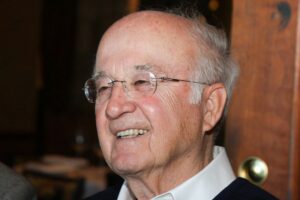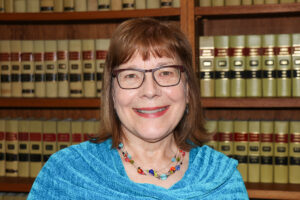Topic: Kansas Constitution

Biography of Wendell Lady, former Speaker of the Kansas House of Represenatives
Interviewed by Edward Flentje
A version of an oral history interview was posted on KansasMemory.org, the website of the Kansas Historical Society prior to the KPHP Board's decision not to publish the interview.
Instead of publishing the interview, the obituary from McGilley State LIne Chapel is posted here.

Interview of Edward (Ed) Reilly, July 2, 2019
Interviewed by Dale Goter
In his 2019 oral history interview former State Senator Ed Reilly recalls controversial issues that went through the Senate Federal and State Affairs Committee during his tenure as chair (1971-1992). Those issues include the death penalty, liquor by the drink, lottery, pari-mutuel wagering, and casino gambling, some of which required adoption of Constitutional amendments. Reilly attributes the acceptance of those cultural changes in part to the need to raise additional state revenue. Reilly recalls professional relationships with the Statehouse press corps and the influence of grass-roots interests. He observed the increase in the number of women in the Legislature and Show Morecomments about their contributions. Show Less

Interview of Lawton Nuss, July 27, 2022
Interviewed by Richard Ross
Retired Chief Justice Lawton Nuss describes his attempts to be appointed to the Court of Appeals (he was not) and to the Supreme Court. Nuss served as Acting Chief during the illness of Chief Justice Davis. After becoming Chief Justice in 2010 he became the chief spokesman and administrator for the entire judicial branch of nearly 1600 employees and 250 judges. In 2014-15 he appointed a Court Budget Advisory committee to help resolve an eight million dollar budget shortfall. He discussed at length the legislative reaction to the Gannon v State school finance case which was Show Morefiled in 2010 and not finally resolved until 2019. Nuss describes his work with the conservative leadership in the state legislature, and a conservative governor, and their attempts to gain more control over the courts. He dealt with budget shortfalls that resulted in closing the courts; attempts to elect rather than appoint judges; and threats to change the role of the courts in the constitution. Nuss was a vigorous defender of the judicial system's independence against legislative interference. He cited the Supreme Court’s Solomon case which essentially answered the question, "‘Should the judicial branch have to give away some of its power granted directly by the people in their Constitution in order to get funding from the legislature.” The court's decisions on school finance continued to provoke the legislature during his tenure. Show Less

Interview of Evelyn Wilson, April 21, 2025
Interviewed by Richard Ross
Justice Evelyn Wilson’s interview provides an excellent explanation of the unique role of the Kansas Supreme Court in very colloquial terms. She shares her personal health struggles and deep commitment to the responsibilities of her position that led her to the decision to retire.
Wilson provided a thorough explanation of how Supreme Court Justices are selected in Kansas and explained the importance of the judicial branch remaining separate from the other two branches of government and emphasizing that each branch was designed to be completely separate. The role of the Judiciary is to interpret the law. She believes Show Morethere is always a method to make the law better, to change the law, if you work within the process that was designed by the writers of the U.S. Constitution. Her closing admonition, “…we all have a job to do, and that job is so important.” It’s to vote. “The Supreme Law is the people’s law, not a king. As long as we protect the republic, that will remain the case. And if we don’t protect the republic, it might not be.”
Highlight -- short excerpt from the interview
